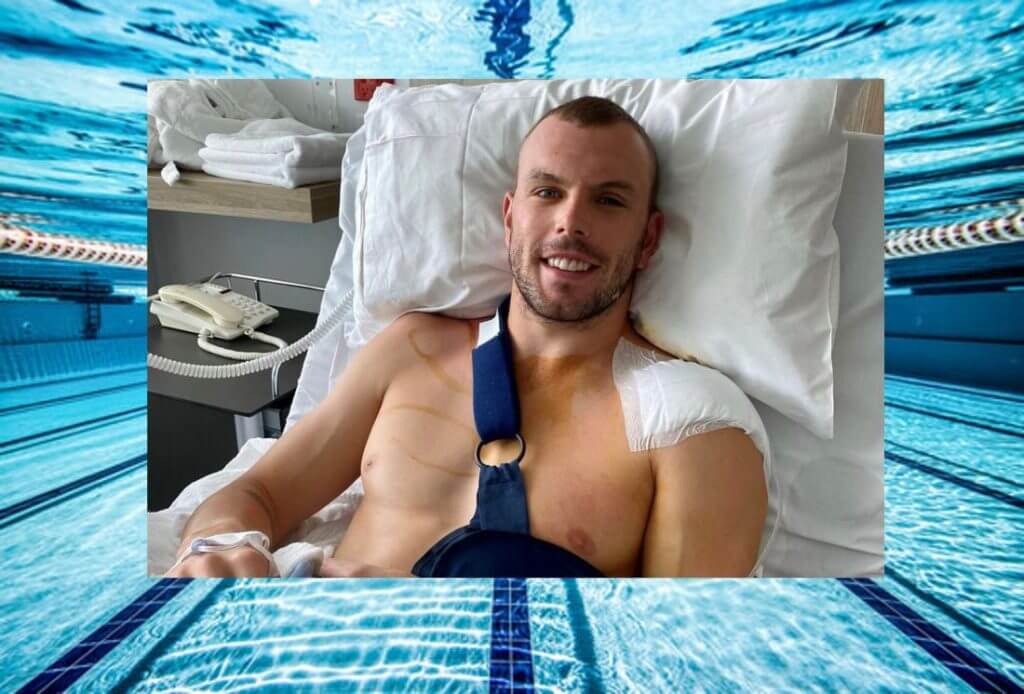Lessons Learned From the Injured Swimmer

Lessons Learned From the Injured Swimmer
And there I was again, sitting on the side of the pool deck with my college’s athletic trainer, watching my teammates practice. All I wanted to do was get back in the water, but my body had other plans. With every day that passed, it felt like I was falling further and further behind. “Why am I always hurt or sick?” I would ask myself almost every season.
“No big deal if I skip stretching.”
“Warm-downs are optional, right?”
“Strength training? Nah, I just want to swim!”
These habits might seem harmless, but they often lead to those dreaded injuries. Whether it’s swimmer’s shoulder, aching knees, or tired tendons, injuries happen to everyone. The key is learning how to overcome them—and even grow from the experience.
Why Injuries Happen
Swimming may not seem like a sport where injuries are common, but if you think about it: every lap involves repetitive motions. You’re practicing nearly every day for hours at a time. Over time, this can take a toll on your body, especially if you’re skipping warm-ups, overtraining, or swimming with poor technique. Shoulder pain in butterflyers and knee issues for breaststrokers are some of the most commonly seen injuries in the sport. Although injuries may seem like a major setback, if you stay smart and stay positive, no progress will be lost at all.
Staying Positive: You’ve Got This
When you’re injured, it’s easy to feel frustrated or left out. I spent countless days watching my teammates practice while I was stuck on the sidelines. It was tough, but I knew that rushing back into the water would do more harm than good. The good news was that I was still able to work on becoming a better swimmer, even when I was out of the water.
1. Set New Goals
If you can’t swim, shift your focus to something else. Maybe it’s improving your core strength with dryland exercises, working on your flexibility, or getting better at visualization. Setting small, achievable goals will help you stay motivated and remind you that progress is still happening.
2. Stay Close to the Team
Even if you’re not swimming, you’re still part of the team. Cheer for your friends, help out with practice, or just hang out on deck. Being involved will keep your spirits up and make you feel like you’re still part of the action. Ask your coach questions, you may learn more than you thought you would about swimming.
3. Learn About Your Body
This is your chance to understand what caused the injury and how to prevent it from happening again. Talk to your coach, athletic trainer, or physical therapist about improving your technique or tweaking your training routine. You’ll come back smarter and more prepared than ever.
Making a Comeback
When you’re ready to get back in the pool (and medically cleared), remember to take it slow. It’s tempting to dive in and start sprinting, but your body needs time to adjust. Start with shorter workouts, focus on perfecting your technique, and listen to your body. If something doesn’t feel right, do not be afraid to speak up.
Coming back from an injury isn’t just about rebuilding your body—it’s about strengthening your mind. Every swimmer has setbacks, but it’s how you handle them that makes you a true champion.
Celebrate the Wins
Injuries can teach you to appreciate the little things: finishing a tough workout, nailing a new skill, or just enjoying the water again. Celebrate those moments—they’re all part of your journey.
You’re Not Alone
Some of the best swimmers in the world have faced injuries. What sets them apart is their determination to push through and not give up. Remember, every setback is a setup for a comeback. Whether it’s working on your mental game, building strength, or supporting your teammates, you’re still moving forward.
Keep the Big Picture in Mind
Swimming isn’t just about the times on the scoreboard—it’s about the lessons you learn along the way. Injuries might feel like roadblocks, but they can also be stepping stones. Stay patient, stay positive, and trust that every challenge you overcome is making you stronger.
So, next time you’re sidelined, don’t see it as the end of the world. See it as a chance to grow in ways you never thought possible. Don’t count the days you are injured, but make the days count.



